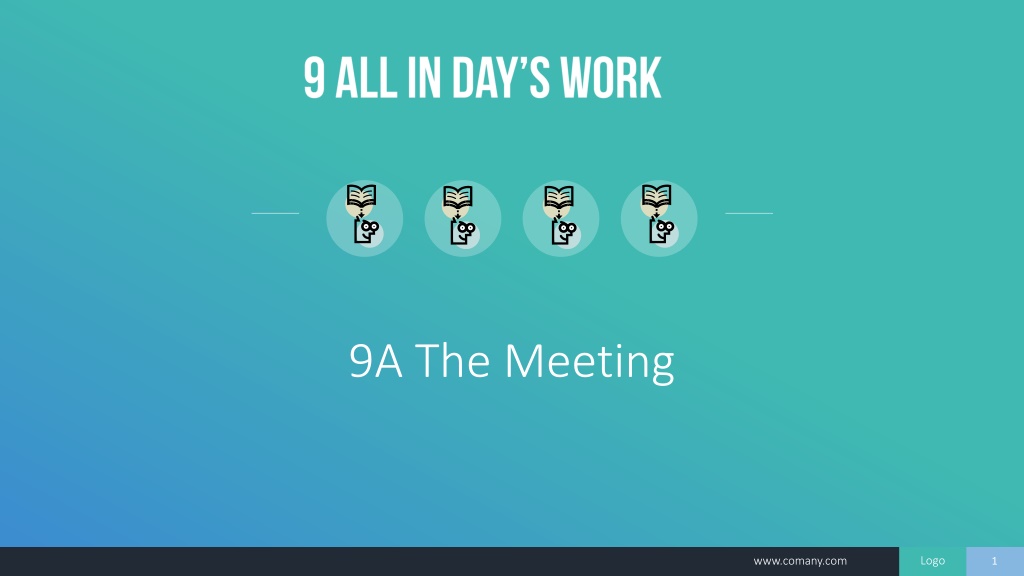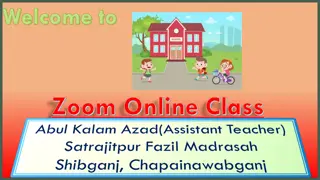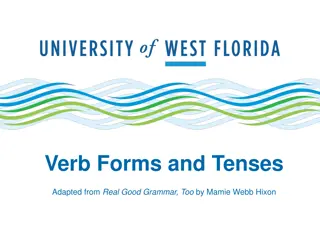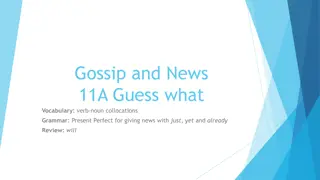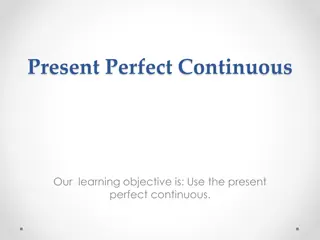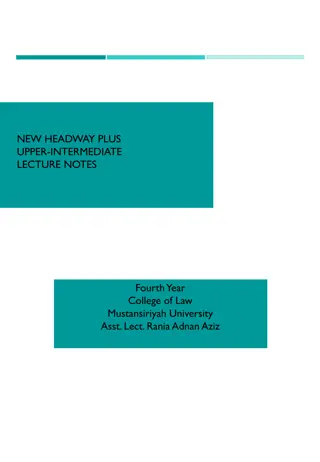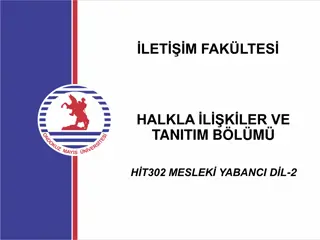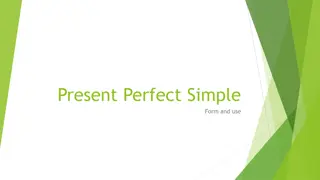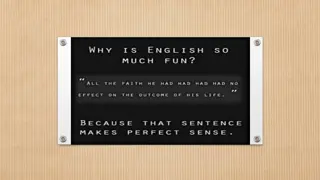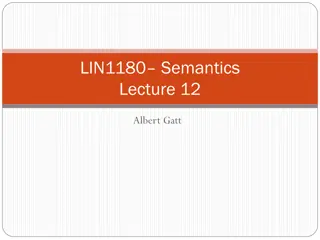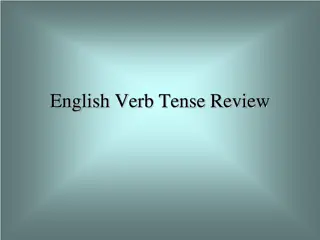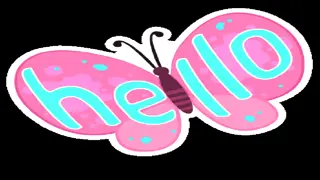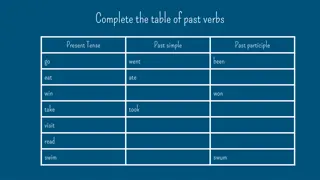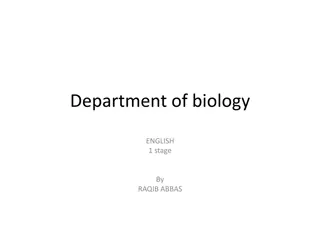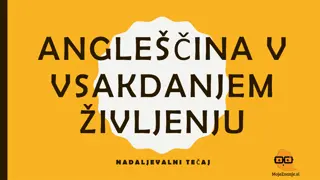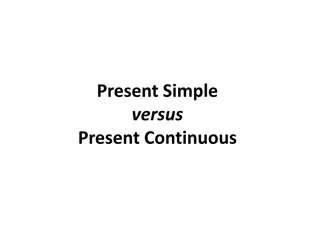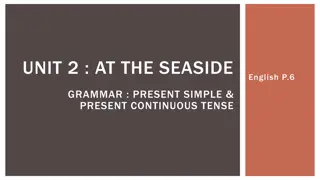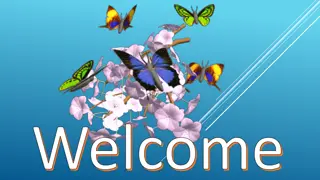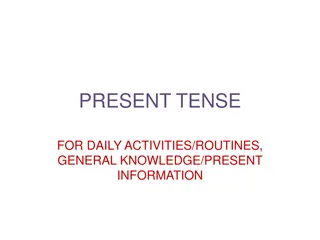Understanding Present Continuous Tense and Verb Forms
The content discusses the Present Continuous Tense, consisting of the verb "be" and the suffix "-ing", its uses in describing ongoing actions at the moment of speaking, planned future events, temporary actions or habits, and expressing irritation. It also covers verb forms with examples and rules for adding "-ing" to different types of verbs.
Download Presentation

Please find below an Image/Link to download the presentation.
The content on the website is provided AS IS for your information and personal use only. It may not be sold, licensed, or shared on other websites without obtaining consent from the author. Download presentation by click this link. If you encounter any issues during the download, it is possible that the publisher has removed the file from their server.
E N D
Presentation Transcript
9A The Meeting Logo www.comany.com 1
muterija poruka pismo sastanak bilje ke kompanija izvje taj ugovor konferencija * We take notes in a meeting or a class, but we write someone a note when we want to leave a short message. Logo www.comany.com 2
a customer pisati kupcu a company pisati kompaniji write to answer sign write contracts - potpisati ugovor letters - potpisati pismo the phone - javiti se na telefon emails odgovoriti na email reports - pisati izvje taje letters - pisati pisma take go to go to meetings - i i na sastanke conferences i i na konferencije meetings - i i na sastanke conferences - i i na konferencije notes zapisivati biljeske messages primiti poruke Logo www.comany.com 3
Sadanje trajno vreme (Present Continuous) se sastoji iz dva dela: glagola be (am, is, are), i glagola se nastavkom ing: I AM PLAYING Sada nje trajno vreme koristimo da opi emo radnju koja se dogadja upravo u trenucima govora. Naj e i prilozi koji idu uz ovo vreme su slede i: now, right now, at the moment, this week/Monday/year Druga upotreba sada njeg trajnog vremena je za opisivanje planirane budu nosti planned future: - I am seeing him tonight. Vide u se sa njim ve eras. Tre a upotreba je za privremene radnje ili privremene navike. I am living with my parents these days. OVIH DANA nam govori da to vi e nije injenica, nije ne to trajno, ve privremeno. Postoji jo jedna esta upotreba sada njeg trajnog vremena. Koristimo ga kada elimo da poka emo da nas ne to nervira, iritira: He is arguing with me. Raspravlja se sa mnom (i to me nervira). Logo www.comany.com 4
Logo www.comany.com 5
Logo www.comany.com 6
Logo www.comany.com 7
Most verbs add -ing Eat eating Speak speaking Most verbs ended with -y, add -ing Buy buying Enjoy enjoying Verbs that ended with -e, drop the -e and add -ing Make making Write writing Verbs that ended with -ee, add -ing See seeing Agree agreeing Logo www.comany.com 8
Verbs ended with a consonant preceded by a vowel, double the consonant and add -ing Swim swimming Run running Do not double the letter if the words ends in two consonants Help helping Talk talking Two-syllable verbs: the last consonant is doubled when the last syllable is stressed Forget forgetting Upset upsetting Do not double the letter if the word has two or more syllables and the last part is not stressed. Visit (first part is stressed) visiting Benefit (first part is stressed) benefiting Logo www.comany.com 9
Do not double the letter if the word ends in -y or -w Buy buying Enjoy enjoying Verbs ended with -ie, change -ie to -y, add -ing Lie lying Die dying Verbs ended with -c, change -c to -ck Picnic picnicking Exceptions: Age ageing Dye dyeing Budget budgeting Enter entering Logo www.comany.com 10
WH question words are at the beginning of the sentence. After them, we use auxiliary verb and subject. We don't use yes or no in the answer. Example Sentences: "Where" question asks for the place: Where is she living? --> She's living in New York. Where are you meeting your friends? --> I'm meeting them at the school. "What" question asks for information about something: What are you eating ? --> I'm eating fruits. "When" question asks for information about time: When are you meeting your father? --> I'm meeting him at 9. "Who" question asks for information about a person: Who is she talking on the phone? --> She is talking to her mother. "Why" question asks for information about reason, explanation: Why is she crying? --> She is crying because she lost her toy car. "How" question asks for information about manner, the way to do: How is Sally singing?--> She is singing very well. Logo www.comany.com 11
avion brod skuter a car taksi autobus voz automobil tramvaj motocikl go on a strike i i na trajk be on a strike biti na trajku journey putovanje normal uobi ajeno the tube = the underground = subway podzemna eljeznica Logo www.comany.com 12
Logo www.comany.com 13
Phone messages and talking on the phone Logo www.comany.com 14
Logo www.comany.com 15
ah - svirati muzi ki instrument Logo www.comany.com 16
Complete the sentences Complete the sentences using Present Continuous using Present Continuous. . 1. I am (watch) _____________________ TV with my family. 2. Why are you (stop) _____________________ the car? 3. Julia is (have) _____________________ lunch in the cafeteria. 4. My wife and I are (plan) _____________________ to travel next summer. 5. Richard is (pay) _____________________ his telephone bill. 6. I am (talk) _____________________ to my friend on the phone. 7. She is (show) _____________________ the report to her boss. 8. My friends are (meet) _____________________ each other in New York. 9. I am (fill) _____________________ the bucket with water. 10. The barber is (cut) _____________________ my hair. 11. Are you (eat) _____________________ breakfast now? 12. I think our team is (win) _____________________ the game! Logo www.comany.com 17
Write the -ing forms (present participles) of these verbs: go _________ hold _________ teach _________ cry _________ sleep _________ run _________ jump _________ stop _________ begin _________ forget _________ hope _________ take _________ drive _________ rise _________ die _________ Logo www.comany.com 18
Put the verb into the correct form Put the verb into the correct form - - Present Simple or Present Continuous Present Simple or Present Continuous. 1 - "Don t talk so loudly!" "I ................... (not / to talk) loudly". 2 - He................... (to know) all about the film. 3 - Jane ................... (to talk) to a friend at the moment. 4 - He ................... (not / to work) on Sundays. 5 - Margaret ................... (to love) music and dancing. 6 - The dog ................... (to sleep) under the table at the moment. 7 - He................... ( not / to like) his job. 8- I ................... (to think) she ................... (to be) very pretty. 9 - I ................... (always / to go) to bed very early. 10 - How often a day ................... (you / to eat) ice-cream? 11 - She ................... (often / to clean) the house on Saturdays. 12 - ................... (they / to go) to the pub every evening? 13 - They ................... (now / to learn) to treat animals. 14 - He ................... (to sit) on an armchair, ................... (to smoke) a pipe. 15 - Good students ................... (always / to study) hard. Logo www.comany.com 19
Put the verb into the correct form Put the verb into the correct form - - Present Simple or Present Present Simple or Present Continuous Continuous 1. They normally _____________________ lunch at two. (have) 2. Are _____________________ in Paris this week? (you work) 3. You _____________________ new clothes every Saturday! (buy) 4. I played football at school but now I _____________________ swimming (prefer) 5. I _____________________ no idea what the book is about. Can you tell me what it s about? (have) 6. John _____________________ a difficult time at the university this year (have) 7. My father _____________________ everything about cars, but nothing about bicycles. (know) 8. The moon _____________________ round the earth. (go) 9. Do _____________________ those men at the door? They _____________________ at us very strangely (you see, look) 10. We _____________________ that the contents of this letter should be changed.(feel) 11. They _____________________ lunch at the moment. You shouldn t disturb them. (have) 12. The watch _____________________ to my grandmother. (belong) 13. I _____________________ what you _____________________ me but I don t agree with you (hear, tell) 14. This medicine _____________________ a new substance (contain) 15. These days we _____________________ tests at school. (always have) Logo www.comany.com 20
Choose the correct words/phrases 1) "I'm calling ________ a problem with a product ." A. about B. to C. with 2) "I'm sorry, John's not in his office right now. Would you like to ________ a message?" A. give B. have C. leave 3) "May I speak with Mrs. Black?" "Yes, of course. Please ________." A. hang B. hold C. pause 4) " I ________ your message." A. got B. had C. see 5) " ________ I speak to John, please?" A. Could B.Can C. Do 6) " Can I call you ________ " A. back B. again C. moment 7) " Please call me ________ my mobile phone. " A. by B. on C. on Logo www.comany.com 21
THANK YOU THANK YOU Logo www.comany.com 22
